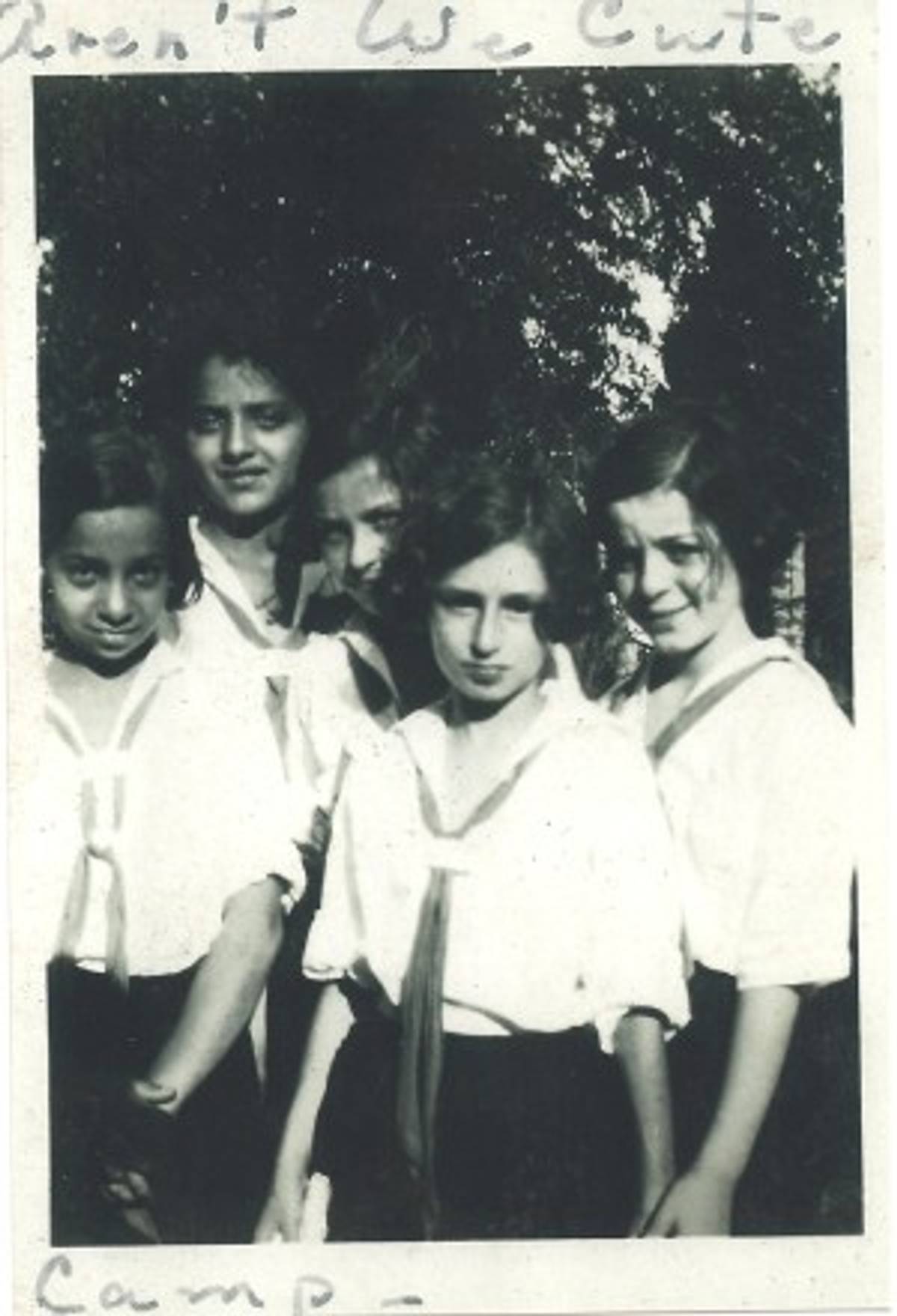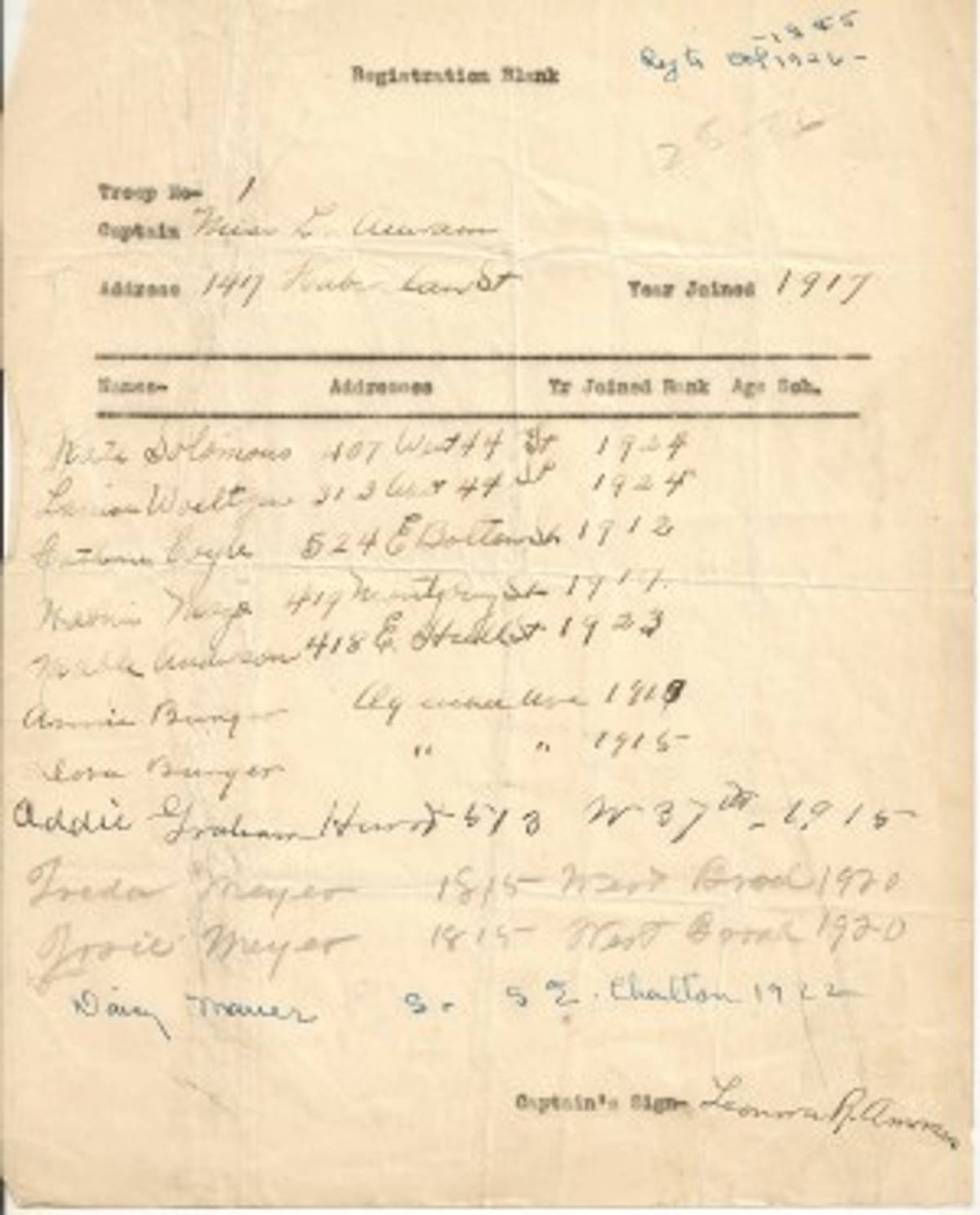
When Juliette Gordon Low, founder of Girl Scouts of the USA, assembled the first group of scouts in Savannah, Georgia, in 1912, she asked four of her closest friends to help out as troop leaders. Three of them—Leonora Amram, Mildred Guckenheimer, and Henrietta Falk—were members of Reform temple Congregation Mickve Israel, the third-oldest synagogue in America.
“The Jewish community has been an essential part of the Girl Scout movement since its beginning,” Girl Scouts spokesperson Kelly Parisi said in an email interview. “One troop leader from the organization’s founding year, Leonora Amram, even served on the first Girl Scout council, and Mildred Guckenheimer later became its secretary.”
Over the last century, Girl Scouts of the USA has grown into an international organization with 2.8 million members. Sales of its famous cookies now amount to nearly $800 million, and their youthful sellers—and many obliging buyers—speak numerous languages and come from diverse religious backgrounds. But the organization’s Jewish roots, dating back to that first troop in Savannah, are still in evidence today—from the existence of Jewish Girl Scout troops, to the Jewish-specific patches that can be earned by the scouts, to the hekhsher that certifies all Girl Scout cookies kosher.
Guckenheimer, the early troop leader, who lived to be 98, was in her twenties when she first got involved with scouting. Her now 97-year-old daughter Marion Mendel said, in a conversation with Tablet last week, “My mother was one of the first Girl Scout leaders, and she was also the first to go on and lead an overnight camping trip.” There were “a few Jewish girls in the first troop,” Mendel noted, although it wasn’t “an all-Jewish troop.” Mendel, who was a Girl Scout herself, recalled playing volleyball as a child in Low’s backyard and learning how to bake biscuits in Low’s home. Scouting became a family tradition: Mendel’s daughter and granddaughter were also Girl Scouts—and are still active members of Mickve Israel.
Low founded the Girl Scouts to serve girls of all backgrounds and beliefs. “While we are a secular organization,” said Parisi, “Girl Scouts has, since the movement began, encouraged girls to take spiritual journeys via their faith’s religious recognitions and by earning the ‘My Promise, My Faith’ pin, which helps deepen the connection between the Girl Scout Law and a girl’s faith.” Various religious organizations allow scouts to show skill and study in their own particular religious affiliation and obtain religious patches accordingly; the National Jewish Committee on Girl Scouting offers four Jewish awards.
In commemoration of the Girl Scouts’ centennial in 2012, Mickve Israel unveiled a yearlong exhibit about the Girl Scouts that emphasized the shared values of Judaism and scouting. And it provided enduring evidence of the old links between Savannah’s historic Jewish community and communal life and the scouting tradition that grew out of it.

As it happens, Savannah’s Jewish Educational Alliance, the local Jewish community center, opened in 1912, the same year the Girl Scouts were organized. Rabbi Robert Haas of Mickve Israel said that according to a book called Third to None, which documents Savannah’s Jewish history, the JEA organized a Jewish Girl Scout troop as early as the 1920s, at a time when Jews might not have been accepted in other business, charitable, and social organizations. Jami Brantley, programs and collections manager at Girl Scouts First Headquarters, said it was tough to say when the first Jewish troop was formed—but that she believed the lack of definitive dates was indicative of how integral the Jewish community was to Girl Scouting from the earliest days.
“The JEA troops provided a wonderful Girl Scout experience for hundreds of girls over the years, many of whom were Jewish,” said Carol Greenberg, who started a Jewish troop in Savannah sponsored by the JEA in the 1990s, when her daughter was growing up. Greenberg explained that the Jewish troops sponsored by the JEA ran activities from there and used the JEA’s kosher kitchen. She added that Jewish troops also accepted non-Jewish members: “We differed only in that we offered sensitivity to the needs of many of our members who were traditional in ritual practice.”
The Jewish troops in Savannah kept glatt kosher and shomer Shabbat. “We specialized in doing mitzvot and earned not only our Girl Scout badges but also our Jewish Scouting Awards,” Greenberg added, explaining that the Girl Scout Council was very supportive of any alterations the Jewish troop needed to make to accommodate their religious needs. “What we were able to gain from the Girl Scout experience is that it broadened the horizons of some of our members who had little contact with friends outside of our tight-knit community and developed talents and strengthened skills that exposed some of them to exciting career choices that they otherwise may not have pursued,” Greenberg said.
For the past few years, Savannah had no Jewish Girl Scout troops, but three months ago, the JEA reopened a Jewish “daisy troop” for 5- and 6-year-old girls. April Komendat, one of the troop’s leaders, said their focus is on Jewish holidays and teaching Girl Scout values like being considerate and caring or courageous and strong from a Jewish perspective. “All of these values translate across so many different religions, and we are just teaching it from Jewish perspective. No one has been turned off by the Jewish thing,” said Komendat. She said that seven Jews and four non-Jews have already signed up.
Komendat added that, being in the South, most of Savannah’s troops were religious Christians, and the idea behind the Jewish troops was to give the Jewish girls their own outlet. “Sometimes we don’t have Jewish lessons, but the fact that the Jewish girls can have an open door to be included in the Girl Scouts and feel free to express their own religion is what we are about,” she said. The daisies are currently working toward the Lehavah patch: “Each girl needs to interview a female religious figure in her own faith and ask them how they feel about one of the lines of the Girl Scout law,” Komendat said, explaining how the patch is earned. “For example, in what ways do you feel that you live a considerate and caring Jewish life?”
According to the National Jewish Committee on Girl Scouting, which opened in 1972, there are three additional Jewish specific patches that scouts can obtain: Bat Or, Menorah, and Or Emunah. Each one is given to the scouts on the basis of age and requires that the scouts fulfill criteria such as learning about Jewish holidays, Israel, or how history and heritage relate to Girl Scouting. There is also the Ora Award, a recognition presented to adults who have given outstanding service to Jewish girls in Girl Scouting or who have extended Girl Scouting in the Jewish community.
Jill Tanney, chairman of the National Jewish Committee on Girl Scouting, said that there are currently Jewish troops all over the United States, but they aren’t necessarily founded as such. “For instance, there was an ultra-Orthodox group of scouts in Rockland County, New York, and it was difficult to be part of them if you didn’t keep Shabbat or keep kosher or do the whole nine yards,” she said.
Estimating how many Jewish girls are involved in Girl Scouts is impossible, said Tanney: “When people register, they don’t ask for their religion, so we can’t even guess. What we can say is that a couple hundred of girls earn recognition each year through our committee, and we know there are scout Shabbats where girls are recognized in their congregation.”
Even Girl Scout cookies have Jewish history baked right in. The Girl Scouts have been selling cookies since 1917. Teresa Victor, a member of Mickve Israel’s museum committee, said that when the troops were first formed, they sold cookies only locally. When they started doing national sales in the mid-1930s, however, it was a kosher bakery that was chosen: Gottlieb’s Bakery in Savannah.

Mendel said she supposed that Gottlieb’s was chosen because it was one of the city’s more popular bakeries, rather than for reasons of kashrut. “Maybe they gave them the best deal,” she joked. Mickve Israel’s museum has the original handwritten receipt of the sale. It shows that in 1936, Gottlieb’s provided the Savannah scouts with their first commercially baked oatmeal cookies. (Gottlieb’s closed in 1994, but Michael Gottlieb, whose grandfather Elliot baked those original cookies, is currently exploring opportunities to reopen the family business in Savannah.)
The Girl Scouts say their cookie program is the largest and most successful girl-led business in the world. Currently, the organization uses two licensed bakers: ABC Bakers and Little Brownie Bakers. While the Girl Scout National Historic Preservation Center does not have an exact date that reflects when these two bakeries started making kosher cookies, neither baker can remember a time when the cookies were not kosher. But it is possible to discern when the boxes began carrying the hekhsher of the Orthodox Union that they have today: Phyllis Koegel, marketing director of the Orthodox Union’s Kosher Division, said that the O.U. began certifying the cookies kosher in 1995.
According to Greenberg, the fact that the cookies are kosher is nothing more than another example that the Girl Scouts offer all girls an equal footing. “I bet that not all girls around the United States needed to know that the cookies were kosher,” she said. “But the Girl Scouts have taken that extra step to ensure that everyone is comfortable and that all of their religious needs are met.”
***
Like this article? Sign up for our Daily Digest to get Tablet Magazine’s new content in your inbox each morning.
Tal Trachtman Alroy is an intern at Tablet.
Tal Trachtman Alroy is an intern at Tablet.